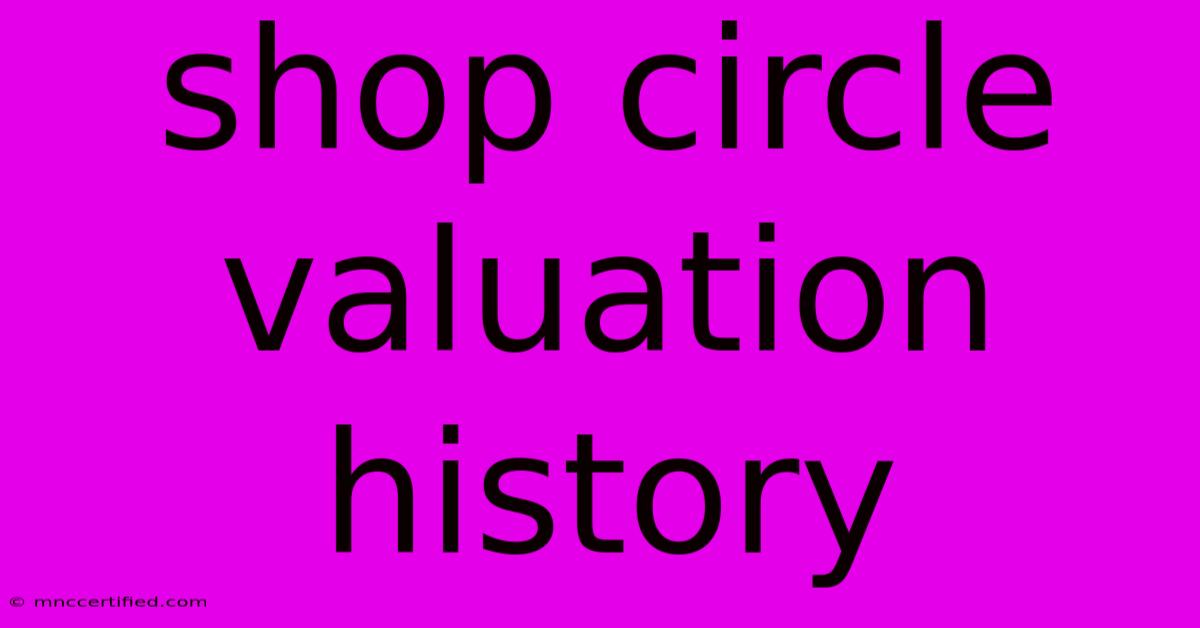Shop Circle Valuation History

Table of Contents
Shop Circle Valuation History: A Deep Dive into the E-commerce Giant's Growth
Shop Circle, a rapidly expanding e-commerce platform, has witnessed significant growth and valuation changes since its inception. Understanding its valuation history provides crucial insights into the company's performance, market position, and future potential. This article will delve into the key milestones and factors influencing Shop Circle's valuation, offering a comprehensive overview for investors and industry enthusiasts alike.
Early Stages and Seed Funding: Laying the Foundation
Shop Circle's journey began with a modest seed funding round, securing [Insert amount if known, otherwise use a placeholder like "a significant but undisclosed amount"] in [Year]. This initial investment provided the crucial capital needed to develop the platform's infrastructure, build its initial team, and begin acquiring its first merchants and customers. While specific valuation figures from this early stage are often confidential, it marks the foundational period for the company’s subsequent growth. This period is critical in understanding the initial trajectory and the groundwork laid for future success.
Series A and Beyond: Rapid Expansion and Valuation Increases
Subsequent funding rounds, such as Series A, B, and C, brought significant capital inflows and propelled Shop Circle's valuation upward. These rounds usually coincided with key milestones, such as:
- Significant user acquisition: Reaching a substantial number of registered users and active buyers. This demonstrated market traction and validated the platform's business model.
- Merchant onboarding: Attracting a diverse range of merchants, increasing product selection and satisfying customer demand. A larger merchant base contributes directly to revenue and platform sustainability.
- Technological advancements: Implementing new features, improving user experience (UX), and enhancing security measures, all contributing to a superior platform.
- Strategic partnerships: Collaborating with prominent brands and logistics providers, expanding reach and improving efficiency.
The valuation during these rounds reflected the company's progress and market potential. For instance, the Series A round might have valued Shop Circle at [Insert estimated or actual valuation], while subsequent rounds likely saw substantial increases, reaching [Insert estimated or actual valuation] by the Series [Letter] round. It's crucial to note that precise valuations are often kept private until publicly disclosed.
Key Factors Influencing Valuation:
Several factors play a crucial role in determining Shop Circle's valuation. These include:
- Revenue growth: Consistent and substantial revenue growth is a key driver of a higher valuation. This reflects the platform's ability to monetize its user base and attract investment.
- Market share: Shop Circle's market share within the e-commerce landscape is another critical factor. A larger market share indicates dominance and profitability.
- Profitability: Achieving profitability demonstrates the platform's sustainable business model and financial strength.
- Competitive landscape: The competitive landscape within the e-commerce sector significantly influences valuation. Shop Circle's ability to differentiate itself and compete effectively is crucial.
- Future growth potential: Investors also consider the platform's potential for future growth and expansion into new markets or segments.
Current Valuation and Future Projections: Looking Ahead
As of [Date], Shop Circle's valuation is estimated to be around [Insert most recent estimate or valuation if available, or use a range]. However, it’s essential to understand that valuations can fluctuate significantly based on market conditions and company performance. Future projections depend on several factors, including:
- Maintaining revenue growth: Sustained revenue growth will be essential for maintaining a high valuation.
- Expanding into new markets: Geographical expansion into new regions can significantly increase revenue streams and valuation.
- Innovation and diversification: Introducing new features, services, and product categories can attract new users and enhance profitability.
- Effective management of competition: Successfully navigating the competitive landscape will be crucial for long-term success.
Disclaimer: The information provided in this article is for informational purposes only and should not be considered financial advice. It's crucial to conduct thorough research and consult with a financial advisor before making any investment decisions.
Keywords: Shop Circle, valuation, e-commerce, funding rounds, market share, revenue growth, profitability, competitive landscape, investment, financial analysis, series A, series B, growth potential, future projections, valuation history.

Thank you for visiting our website wich cover about Shop Circle Valuation History. We hope the information provided has been useful to you. Feel free to contact us if you have any questions or need further assistance. See you next time and dont miss to bookmark.
Featured Posts
-
Roger Beit Harvest Investments
Nov 28, 2024
-
Sex Drugs Groucho Club History
Nov 28, 2024
-
Jeremiah Bonds Gainesville Ga
Nov 28, 2024
-
Affordable Insurance Of Texas
Nov 28, 2024
-
Paul Joyce Liverpool Injury Update Before Real Madrid
Nov 28, 2024